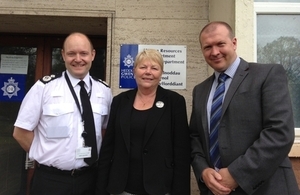Wales Office Minister marks introduction of Modern Slavery Bill
Flagship Bill published today by the Home Secretary Theresa May

Baroness Randerson visits Gwent Police
Wales Office Minister Baroness Randerson today welcomed tough new UK government legislation to stamp out modern slavery as part of its commitment to support victims of human trafficking and domestic servitude.
The Bill - the first of its kind in Europe - will strengthen the powers to prevent modern slavery and human trafficking while improving support and protection for its victims.
Baroness Randerson recently visited Gwent Police to see firsthand the action being taken to tackle modern slavery in the UK.
She was briefed on the work of Operation Imperial – a unit set up to investigate alleged offences of slavery and servitude and the largest inquiry of its kind in the UK. The investigation has led to the recovery of a number of vulnerable adults and arrests have been made.
Wales Office Minister Baroness Randerson said:
Modern slavery and human trafficking are despicable crimes. They are crimes that often go unseen in quiet cul-de-sacs, streets and roads around the world, and as we have recently seen, on our very doorsteps here in Wales.
Addressing these issues require a tireless and coordinated effort across government and law enforcement, as well as increased awareness within our communities.
The publication of this Bill is a clear demonstration of the government’s steadfast commitment to supporting victims and stamping out modern slavery.
It will consolidate and toughen existing legislation, making the UK a hostile environment for modern slave drivers and ensuring that perpetrators receive suitably severe punishments for their abhorrent crimes.
For further information on the Modern Slavery Bill click here
NOTES TO EDITORS
-
To see the Home Office’s press notice click here
-
The Bill will be published online here and for further information please see the Bill page here
-
Modern slavery encompasses human trafficking, slavery, forced labour and domestic servitude. The National Crime Agency figures for 2013 show the NRM received 1,746 referrals of potential victims of trafficking. The source countries for the greatest number of potential victims referred into the NRM for support and protection were Albania, Nigeria, Vietnam and Romania.
-
There has been extensive scrutiny of the Government’s approach to tackling modern slavery, and the Bill’s provisions. At the Home Secretary’s request, Frank Field MP chaired evidence sessions on modern slavery in Autumn 2013. A draft Bill was published to enable pre-legislative scrutiny. The joint Committee on the draft Bill held a call for evidence, heard thirteen days of oral evidence sessions, and reported on 8 April 2014.
-
To complement the Bill, the Government is taking non-legislative action to tackle modern slavery. This includes:
- trialling child advocates to give child trafficking victims more tailored support
- establishing specialist multi-agency safeguarding and anti-trafficking teams at the border;
- reviewing the support that victims receive – through the National Referral Mechanism and the victim care contract
- making modern slavery a priority for the National Crime Agency (NCA). The NCA will use its intelligence, tasking and coordination functions to build a more comprehensive picture of the threat.